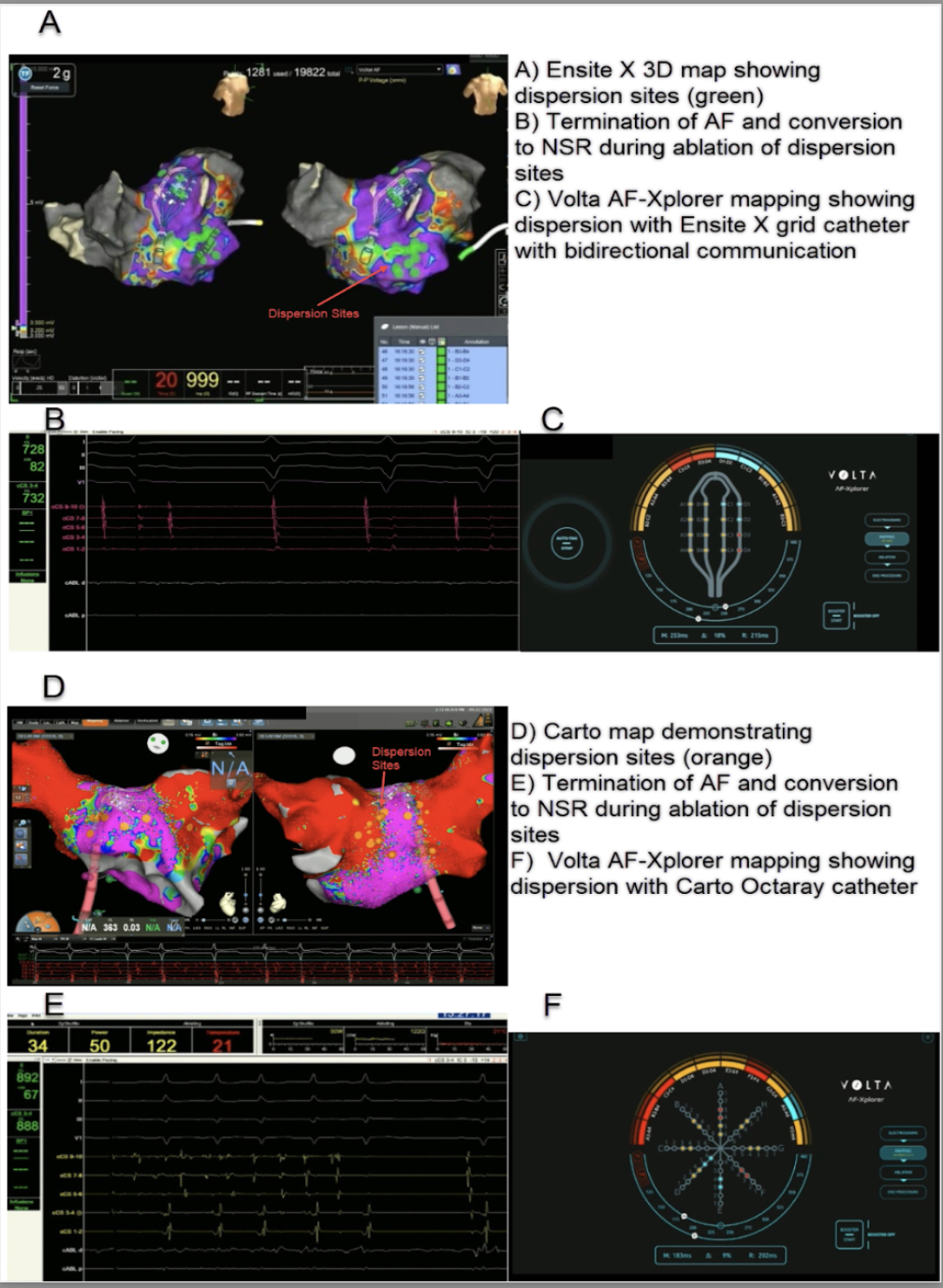Final ID: MDP1174
Feasibility and Outcomes of Using an Intraprocedural Artificial Intelligence System in Recognizing Regions of Dispersion and Generating Sequential Maps to Assist in Radiofrequency Ablations for Persistent Atrial Fibrillation
Abstract Body (Do not enter title and authors here): Background:
Pulmonary vein isolation (PVI) is the cornerstone therapy during catheter ablation of atrial fibrillation (AF) isolation. 30% of patients continue to have recurrent AF despite pulmonary vein (PV) isolation. Defining targets for catheter ablation in PV non responder subgroup continues to be challenging despite technological advances. Volta AF-Xplorer™ (VX) is an artificial intelligence (AI) system that analyzes intracardiac signals using electrocardiograms to recognize regions of spatial temporal dispersion and generate sequential maps as targets for ablation.
Objective:
We aim to assess the clinical feasibility and outcomes of the VX AI mapping algorithm during RF catheter ablations to treat recurrent persistent AF in PV non responders.
Methods:
A single center prospective analysis of patients undergoing repeat ablation for recurrent persistent AF using VX mapping software was performed. All patients had previous PVIs, with recurrence of AF and failed at least 2 antiarrhythmic drugs. Patients underwent 3D mapping using Carto and Ensite X mapping systems with real time detection and annotation of spatial temporal dispersion using the Volta technology. The identified targets were ablated until endpoints of termination and non inducibility was achieved and intraprocedural data points were recorded.
Results:
19 patients with a mean age of 67±10.15 years 63.2% male were included in this analysis. Average total procedure time was 68±33 min and average mapping time was 17±10 min. Ablations were performed under zero fluoroscopy. PVI was confirmed in all cases. Ablation was performed at dispersion points identified using the AI mapping system. Termination was achieved in 18 out of the 19 cases (94.7%). 16 patients converted directly to normal sinus rhythm (NSR) and 2 patients to atrial flutter and then to NSR. The one patient that did not terminate required cardioversion but was not inducible with pacing maneuvers.
Conclusion:
This experience highlights the clinical safety, utility, feasibility, and outcomes of the Volta AF-Xplorer AI mapping software during catheter ablation of PV non responders for recurrent persistent AF.
Pulmonary vein isolation (PVI) is the cornerstone therapy during catheter ablation of atrial fibrillation (AF) isolation. 30% of patients continue to have recurrent AF despite pulmonary vein (PV) isolation. Defining targets for catheter ablation in PV non responder subgroup continues to be challenging despite technological advances. Volta AF-Xplorer™ (VX) is an artificial intelligence (AI) system that analyzes intracardiac signals using electrocardiograms to recognize regions of spatial temporal dispersion and generate sequential maps as targets for ablation.
Objective:
We aim to assess the clinical feasibility and outcomes of the VX AI mapping algorithm during RF catheter ablations to treat recurrent persistent AF in PV non responders.
Methods:
A single center prospective analysis of patients undergoing repeat ablation for recurrent persistent AF using VX mapping software was performed. All patients had previous PVIs, with recurrence of AF and failed at least 2 antiarrhythmic drugs. Patients underwent 3D mapping using Carto and Ensite X mapping systems with real time detection and annotation of spatial temporal dispersion using the Volta technology. The identified targets were ablated until endpoints of termination and non inducibility was achieved and intraprocedural data points were recorded.
Results:
19 patients with a mean age of 67±10.15 years 63.2% male were included in this analysis. Average total procedure time was 68±33 min and average mapping time was 17±10 min. Ablations were performed under zero fluoroscopy. PVI was confirmed in all cases. Ablation was performed at dispersion points identified using the AI mapping system. Termination was achieved in 18 out of the 19 cases (94.7%). 16 patients converted directly to normal sinus rhythm (NSR) and 2 patients to atrial flutter and then to NSR. The one patient that did not terminate required cardioversion but was not inducible with pacing maneuvers.
Conclusion:
This experience highlights the clinical safety, utility, feasibility, and outcomes of the Volta AF-Xplorer AI mapping software during catheter ablation of PV non responders for recurrent persistent AF.
More abstracts on this topic:
A novel risk score predicts the prevalence of left atrial low-voltage areas and rhythm outcome in patients undergoing long-standing persistent atrial fibrillation ablation
Ooka Hirotaka, Nakao Sho, Kusuda Masaya, Ariyasu Wataru, Kudo Satoshi, Fujii Subaru, Mano Toshiaki, Matsuda Yasuhiro, Masuda Masaharu, Okamoto Shin, Ishihara Takayuki, Nanto Kiyonori, Tsujimura Takuya, Hata Yosuke, Uematsu Hiroyuki
Ablation for Atrial Fibrillation: A Comprehensive Meta-Analysis of Randomized Controlled Trials with Reconstructed Time-to-Event DataMi Jiaqi, Katapadi Aashish, Darden Douglas, Uppalapati Sree Varuntej, Kabra Aanya, Katapadi Aashika

